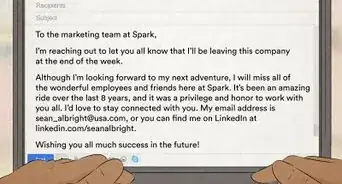This article was co-authored by Amber Rosenberg, PCC. Amber Rosenberg is a Professional Life Coach, Career Coach, and Executive Coach based in the San Francisco Bay Area. As the owner of Pacific Life Coach, she has 20+ years of coaching experience and a background in corporations, tech companies, and nonprofits. Amber trained with the Coaches Training Institute and is a member of the International Coaching Federation (ICF).
This article has been viewed 83,841 times.
If it has to be you, at least you can make the process as comforting as possible. Whether you've gotten to be close with someone you work with, or you brought an old friend into your company, read these steps to learn how to distinguish between your responsibilities as a friend and as an employer, sympathize with your friend, and make the process quick and painless.
Steps
Having the Conversation
-
1Make it as short as possible. Give yourself a brief time window to have the conversation in "employer mode" and then offer yourself for "friend mode" shortly thereafter. If your friend wants to talk about things after they've gotten an opportunity to cool down and think about the situation, make yourself available to meet for a drink or a bite to eat after work and talk more, but keep the actual conversation as brief as possible.
- Isolate your role as employer from your role as friend.[1] Be the boss, not the friend, when you tell your friend that his or her job is terminated. This is important both for your own state of mind and for the way your friend perceives the action.
- Ultimately, you lay off a friend the same way you would lay off anyone else—the key is keeping it professional by creating boundaries.[2]
-
2Cut to the chase. Be direct about the decision to let him or her go. Beating around the bush or using humor will likely not soften the blow and can actually give a false impression that things can be turned around so that he or she might be able to stay. Creating this sort of uncertainty is unkind and ultimately can damage your friendship even more.Advertisement
-
3Explain that you value your friendship.[3] Make it clear that the friendship is a separate issue and that you, or the company, are paying for job performance, which hasn't been met. The job is a purely economic issue. Soften this reality by explaining that as far as you're concerned, your work situation will not interfere with your social relationship and reassure him or her that your extra-curricular friendship will remain on the same footing as always.
-
4Support your friend through the termination process. Explain severance pay, help him or her move his or her stuff, keep the security guard from bugging him or her, and do all the other small kindnesses you would want your boss to do for you in such a circumstance.
- Offer to do what you can to help your friend to find work elsewhere. As part of your friend-role, consider offering an excellent reference and being available to help him or her work through cover letters and CV revamps.[4] Look for job openings before having the conversation to have something else set up in advance.
-
5Wait a while before making contact as a friend. Your friend may be hurt and upset and pestering them with phone calls to continue your regular football-watching routine might make the matter worse. Make yourself available, but let it be on your friend's terms.
- Shoot your friend a text to let them know you'll be watching football and would be happy to have some company, but let it be their decision. Avoid guilting them into socializing.
Deciding What to Say
-
1Anticipate your friend's reaction. Regardless of who does the firing, your friend will probably feel hurt and embarrassed for losing the job and may say things out of anger to anyone who will listen. The fact that a friend is doing the firing, though, will obviously complicate the matter. If you don't want to lose the friendship, you need to go into the process understanding that your friend might blame you, and prepare to deal with that response.
- Imagine the worst or most hurtful thing your friend might throw at you in anger. Assume this will be said and don't take it personally.
-
2Plan out what you'll say. Consider writing a script and memorizing it. Stick to the script. Don't use the confrontation as the time to struggle for words. Lay out the course of action as succinctly and honestly as you possibly can. You need to lay out the case just as you would any other employee.
- If a boss told you to fire your friend, it's ok to pass the buck. Present the reasons as honestly as possible for the firing and offer your sympathy to your friend. Even if you agree with your boss's rationale, it's probably not the time to voice it:
- "It's not my call to make. I wish it could be some other way, but my hands are tied."
- If your friend has done something unethical or harmful for the company and it's your decision to terminate their employment for the good of the company, focus on the other employees to whom you owe as much as to your friend:
- "We go way back, and you're my friend, but it can't work this way. I have to think about all my other employees, too. If I don't listen to them, this business could fall apart."
- If your friend is underperforming or unsuited to the role assigned, focus on the conversation as a favor and an opportunity to succeed elsewhere, rather than a failure:
- "I want to see somewhere you'll be happy and your talents can be used like they deserve to be used. I'm sorry that place can't be here."
- If a boss told you to fire your friend, it's ok to pass the buck. Present the reasons as honestly as possible for the firing and offer your sympathy to your friend. Even if you agree with your boss's rationale, it's probably not the time to voice it:
-
3Try to think of it as an opportunity to comfort, rather than a burden. At least your friend doesn't have to be fired by a jerk who doesn't care about their feelings. Approach the task as an unfortunate opportunity to use your knowledge of your friend to make the termination process as smooth and as painless as possible.
Finding Alternatives
-
1Lay out a plan for improved performance. If it's possible to give your friend another chance, creating a concrete time frame for them to improve performance by coaching or training them toward a specific set of goals. Schedule weekly meetings to discuss improvement.
- Make it clear that your friend's job will be terminated if the new set of goals is not met in the time discussed. If it doesn't happen, go through with the termination knowing that you gave them as much of a chance as possible.
- Document your discussion and keep this report with your employee records. You may need to deal with objections by referring to the documentation of your previous conversations, so keep good records.
-
2Change your friend's job title or job description. If it's in your power, you might consider reorganizing your friend's job to essentially demote your friend, or give them an opportunity to save face by quitting. You'll need to have a similar conversation, letting them know that their performance isn't up to par, but that you value their friendship and wanted to offer them this opportunity in a job with fewer responsibilities.
- Organize the position such that your friend's weaknesses might be lessened by the new position, making it a win-win. Your friend either gets to leave the company for greener pastures, or stay on in a position in which there is an opportunity for success.[5]
- Alternatively, consider a promotion or a transfer. While this might be considered "passing the buck," if you can get rid of your friend without firing them outright, you can avoid the ugly confrontation. If you can get your friend a new job with a similar company, you'll have solved both your problems.
-
3Let someone else do it. It may be that there is too much conflict of interest involved in your firing your friend. In this case, talk to either a supervisor, subordinate, or the HR department at your company to plan for another course of action.
Expert Q&A
-
QuestionHow do you fire someone easily?
 Amber Rosenberg, PCCAmber Rosenberg is a Professional Life Coach, Career Coach, and Executive Coach based in the San Francisco Bay Area. As the owner of Pacific Life Coach, she has 20+ years of coaching experience and a background in corporations, tech companies, and nonprofits. Amber trained with the Coaches Training Institute and is a member of the International Coaching Federation (ICF).
Amber Rosenberg, PCCAmber Rosenberg is a Professional Life Coach, Career Coach, and Executive Coach based in the San Francisco Bay Area. As the owner of Pacific Life Coach, she has 20+ years of coaching experience and a background in corporations, tech companies, and nonprofits. Amber trained with the Coaches Training Institute and is a member of the International Coaching Federation (ICF).
Pacific Life Coach Be direct from the start, explaining why they're being laid off and how their position is no longer available. Then, explain any actions that need to be taken before they leave, like time sheet submissions, exit paperwork, or unemployment paperwork.
Be direct from the start, explaining why they're being laid off and how their position is no longer available. Then, explain any actions that need to be taken before they leave, like time sheet submissions, exit paperwork, or unemployment paperwork. -
QuestionWhat to say to a friend you fired?
 Amber Rosenberg, PCCAmber Rosenberg is a Professional Life Coach, Career Coach, and Executive Coach based in the San Francisco Bay Area. As the owner of Pacific Life Coach, she has 20+ years of coaching experience and a background in corporations, tech companies, and nonprofits. Amber trained with the Coaches Training Institute and is a member of the International Coaching Federation (ICF).
Amber Rosenberg, PCCAmber Rosenberg is a Professional Life Coach, Career Coach, and Executive Coach based in the San Francisco Bay Area. As the owner of Pacific Life Coach, she has 20+ years of coaching experience and a background in corporations, tech companies, and nonprofits. Amber trained with the Coaches Training Institute and is a member of the International Coaching Federation (ICF).
Pacific Life Coach Let them know that you're really grateful for the time and service they put into their job. If possible, offer steps to help them find another position—this might mean referring them to career coaching and career placement services and/or offering to serve as a reference for them.
Let them know that you're really grateful for the time and service they put into their job. If possible, offer steps to help them find another position—this might mean referring them to career coaching and career placement services and/or offering to serve as a reference for them.
Warnings
- Make sure that everything you do is in compliance with employment laws to avoid being guilty of violating a law and being sued for it.⧼thumbs_response⧽
References
- ↑ Amber Rosenberg, PCC. Pacific Life Coach. Expert Interview. 8 March 2022.
- ↑ Amber Rosenberg, PCC. Pacific Life Coach. Expert Interview. 8 March 2022.
- ↑ Amber Rosenberg, PCC. Pacific Life Coach. Expert Interview. 8 March 2022.
- ↑ Amber Rosenberg, PCC. Pacific Life Coach. Expert Interview. 8 March 2022.
- ↑ http://www.forbes.com/2007/10/16/firing-friend-workplace-lead-careers-cx_tw_1016bizbasics.html






































































